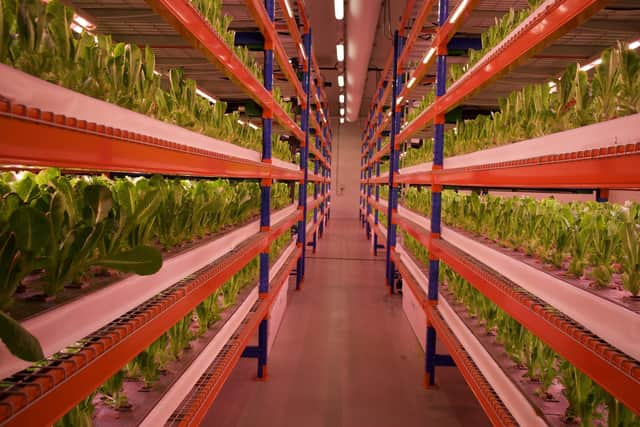Supplying what we need
and live on Freeview channel 276
In recent times the unavailability in supermarkets of popular food, like tomatoes and peppers, has been apparent. There are a number of contributing factors which have also impacted other food supplies. The logical response is to consider the issue of food security and investigate different sources. One alternative to traditional farming is what has been called ‘vertical farming’. It’s farming but not as you and I know it – as there is no soil. There are no tractors, no silos or rolling ploughed fields either. Instead, the crops are stacked in neat layers and grown inside, in controlled conditions.
Having removed the amount of growing space required drastically, it also removes the confines of a growing season, with crops harvested all year round. A sophisticated irrigation system delivers a nutrient mix to the plant’s roots, with finely tuned LED lights acting as the sun.
Advertisement
Advertisement
This new agricultural method is very much in its infancy and currently has clear limitations. While those advocating vertical farming extol it as the future, critics point to its limited application and declare it doesn’t have the ability to grow onions, potatoes, or cereal crops commercially. One cynical comment I encountered on the subject was “man cannot live on cut herbs and ‘microgreens’ alone.”


This phrase resembles a statement found in the Bible. Jesus has been fasting for forty days as Satan tempts Him to turn stones into bread. Jesus replies, “It is written, “Man shall not live by bread alone, but by every word that comes from the mouth of God”” (Matthew 4:4). Despite His intense hunger Jesus will not follow the devil’s advice, but trusts God. His goal was to fulfil God’s plan and die on the cross as a sacrifice for sin.
Jesus is quoting from Deuteronomy 8:3, which also reminds the Israelites how God supplied them while they wandered in the desert after being freed from Egypt. Their lives did not automatically depend on what they could grow or produce – their lives depended on what God determined and provided.
The challenge of Jesus’ statement for us today is twofold: Firstly, a reminder that the spiritual is more important than the temporal. If we really want to live, the only way to do this is by knowing the Word of God and accepting the Saviour it highlights. Secondly, it is a call to live guided by His Word. The physical food that we eat can only nourish the body. Mankind was created in God’s image as a spiritual being with a soul, so we must not neglect to feed our souls.
Advertisement
Advertisement
We can never experience a life of joy, satisfaction and purpose without a recognition that these things are neither accomplished by anything we do, or available in the world, but through Jesus, “the good shepherd” – the one who declares “I have come that they may have life, and that they may have it more abundantly” (John 10:10).
In the spiritual realm if you receive Jesus as your Saviour you will never lack anything. Empty shelves might continue to be a reality, even with new farming techniques, but we have a God who knows our needs and will supply them. The Apostle Paul in Philippians 4:19 says“…my God shall supply all your need according to his riches in glory by Christ Jesus.” Can you say all your needs are met because you are trusting in Christ?
Having grown up in rural Tyrone, after leaving school at the age of 16, Knox worked for over 20 years on the family dairy farm near Aughnacloy. Having felt the call of God to full-time ministry, he was ordained in 2005 serving as minister of two Presbyterian congregations for 14 years. In 2019 he was called to be minister of Aghadowey and Crossgar Presbyterian Churches in County Londonderry.
If you would like to talk to someone about any of the issues raised in this article, please email Rev Kenny Hanna, PCI’s Rural Chaplain at [email protected] or call him on 07938 488 372.